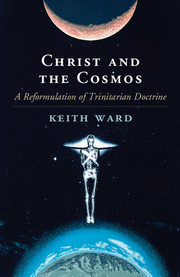Book contents
- Frontmatter
- Contents
- Preface
- Acknowledgements
- PART I THE THREEFOLD NATURE OF THE DIVINE BEING
- 1 Introduction: Talking about the Trinity
- 2 Why We May Need to Restate the Ways in Which We Talk about the Trinity
- 3 The Doctrine of Divine Simplicity
- 4 Cosmological and Axiological Explanation
- 5 Divine Potentiality and Temporality
- PART II THE BIBLICAL SOURCES OF TRINITARIAN THOUGHT
- PART III THE TRINITY, IMMANENT AND ECONOMIC
- PART IV THE SOCIAL TRINITY
- PART V THE COSMIC TRINITY
- Bibliography
- Subject Index
- Name Index
5 - Divine Potentiality and Temporality
from PART I - THE THREEFOLD NATURE OF THE DIVINE BEING
Published online by Cambridge University Press: 05 September 2015
- Frontmatter
- Contents
- Preface
- Acknowledgements
- PART I THE THREEFOLD NATURE OF THE DIVINE BEING
- 1 Introduction: Talking about the Trinity
- 2 Why We May Need to Restate the Ways in Which We Talk about the Trinity
- 3 The Doctrine of Divine Simplicity
- 4 Cosmological and Axiological Explanation
- 5 Divine Potentiality and Temporality
- PART II THE BIBLICAL SOURCES OF TRINITARIAN THOUGHT
- PART III THE TRINITY, IMMANENT AND ECONOMIC
- PART IV THE SOCIAL TRINITY
- PART V THE COSMIC TRINITY
- Bibliography
- Subject Index
- Name Index
Summary
I now want to argue that a freely creative God of love must logically be a God who is temporal in some respects, because free creation entails choosing between alternative states, and choosing entails change from potency to actuality, and change entails a form of temporality. Love, as humans understand it, also involves conscious relationship and responsiveness to others, and if these others are changing, as humans are, this entails change in response to changes in them. Furthermore, causing free creative and self-developing beings to exist brings about great goods that could not otherwise exist and therefore is a good reason for creating a universe. So a complex and temporal God provides a good explanation for the existence of a universe such as ours. If this is true, the ground is prepared for positing a threefoldness in the being of God and for building up a view of this threefoldness which can provide a distinctive picture of the dynamic, creative, and loving relationship of God to the created order.
I will first argue for the existence of potentiality in God. When Thomas says that the actual takes precedence over the potential, he does not deny, but rather affirms, the existence of potential things. For if one thing takes precedence over another, then that other clearly exists. So there are potential things, and indeed virtually all created things have potentiality – states that they could manifest but do not yet manifest. However, theologians such as Aquinas say that since God is absolutely simple, there can be no potentiality in God. If there were, we would have to distinguish what is actual in God from what is potential. But if we cannot do that, then God must be, as Aquinas says, ‘purely actual’. But that entails that God cannot do anything other than God does. It seems to me an odd definition of ‘omnipotence’ to say that though God is omnipotent, God is unable to do anything other than what God does (though the theologian Friedrich Schleiermacher bravely accepted this view). It seems better to say that a truly omnipotent being would be able to do infinitely many things that it has not and perhaps will not do. But this entails that such a being – and even the most powerful possible, yet maybe not completely omnipotent, being – would incorporate huge numbers of possibilities.
- Type
- Chapter
- Information
- Christ and the CosmosA Reformulation of Trinitarian Doctrine, pp. 23 - 30Publisher: Cambridge University PressPrint publication year: 2015



